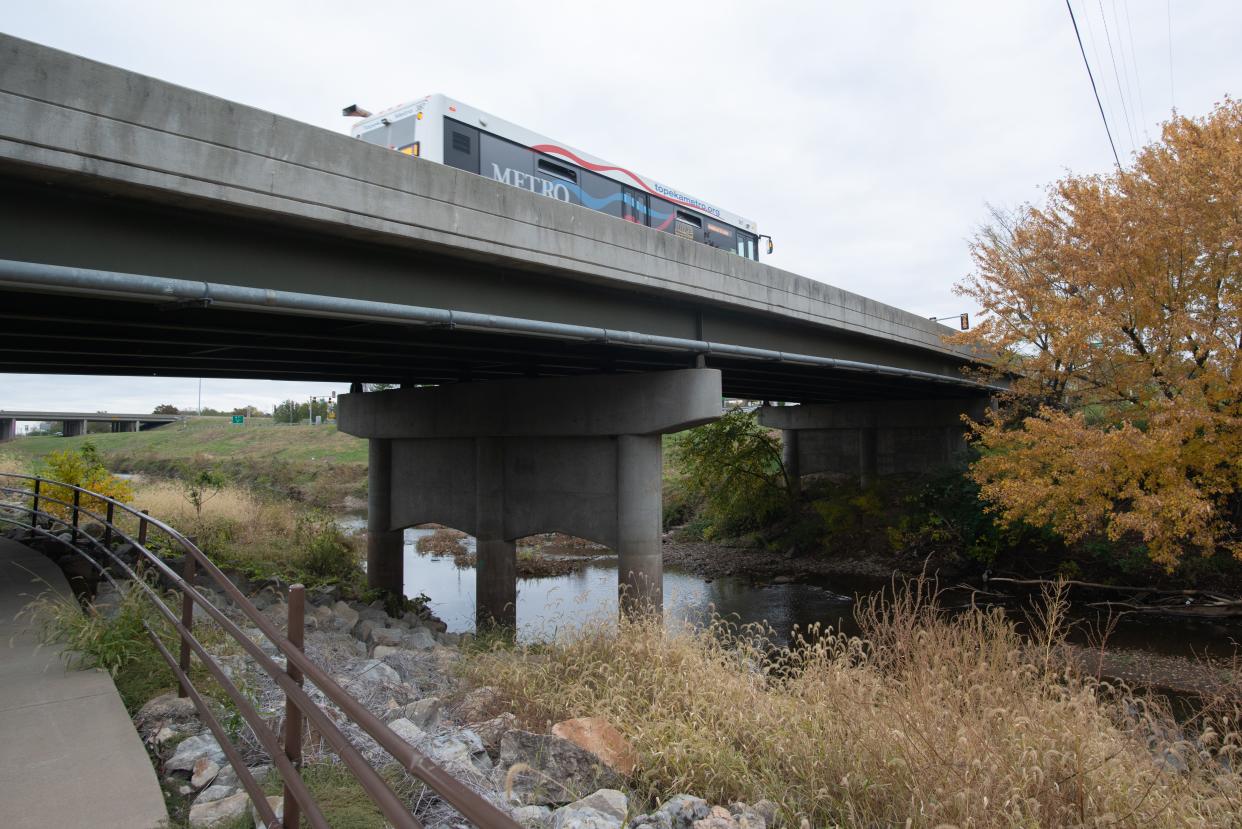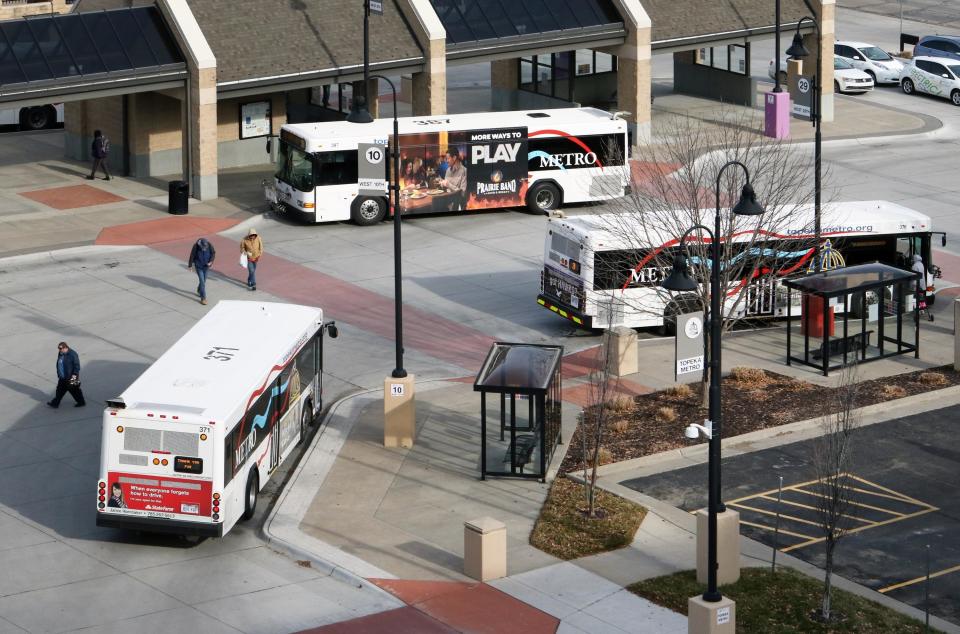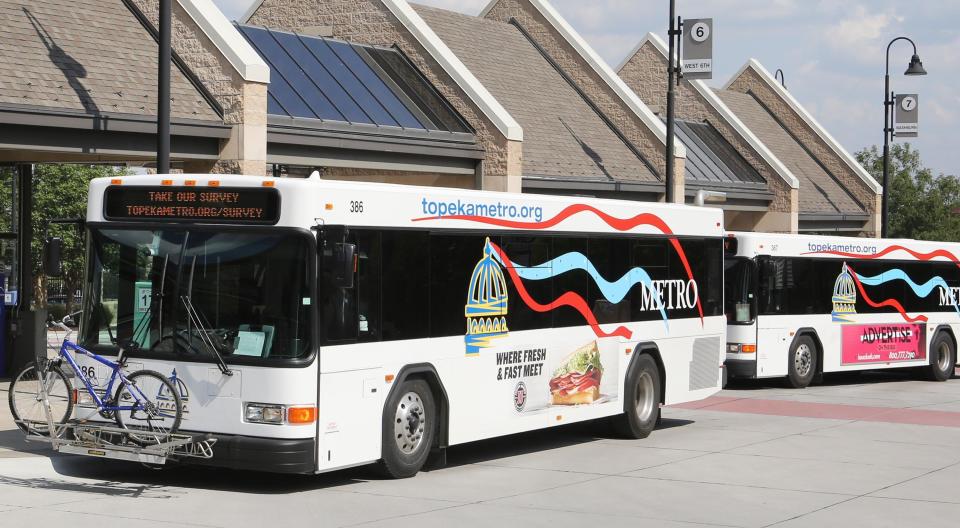Jim Daniel shared valued counsel often in 35 years with Topeka's bus service. He's left its board.

Growing up in the 1950s and 1960s, Jim Daniel often rode the green and white General Motors buses operated by the for-profit company that provided mass transit service to Topeka until it went out of business.
Many of those same aging buses were still being used when Daniel started work as a planner for the Topeka Metropolitan Transit Authority in 1974, after Topekans voted the previous year to replace the private service with a city-run service, Daniel said.
Those buses lacked air conditioning, two-way radios and power steering, the 74-year-old Daniel recalled this past week.
"Communication between buses was virtually nonexistent," he said.
But those days are long gone, he said.
Topeka Metro, the city's current bus service, provides a "thoroughly modern experience for today's transit riders," Daniel said.
'Family comes first' for former Metro advocate

Daniel spent 35 of the past 48 years as an employee and board member for TMTA, which oversees the service now known as Topeka Metro.
But Daniel resigned from the TMTA board effective June 30 to relocate with his wife, Linda Daniel, to Derby, the hometown of their daughter, son-in-law and granddaughters, ages 8, 6, 4 and 1.
"I was honored to serve and resigned reluctantly," he said. "But family comes first."
Another reason Daniel stayed in Topeka was to help care for his mother, Georgia Ruth Daniel, who died here last November at the age of 101.
Topeka's bus service doesn't buy tires

Daniel's move is "Derby's gain and Topeka's loss." said Susan Duffy, who was Topeka Metro's general manager from 2012 until 2019, when she took her current position as a member of the Kansas Corporation Commission.
Daniel was "a pleasure to work with" and proved to be particularly valuable in terms of being able to "see the big picture" and "focus on what the real issues were," Duffy said.
"I valued his counsel many times on issues before us," she said.
Daniel was an "incredible source of institutional knowledge" for Topeka Metro board members and employees, in terms of how much he knew both about Topeka and about mass transit in general, Duffy added.
Because he spent nine years as an employee of the city's bus service, Daniel said he gained a good working knowledge about how it operates in terms of such things as cleaning, maintenance and refueling.
For example, he said, he learned that Topeka Metro — like all public bus services — doesn't buy tires.
It leases them, which is cheaper, as part of a process that facilitates safety while ensuring tires are inspected monthly by representatives from Goodyear, its provider.
Growing up in Topeka
Daniel was born in Topeka's Christ Hospital, two years before it merged in 1949 with the Jane C. Stormont Hospital and Training School for Nurses to create what is now Stormont Vail Health.
He said he grew up living at 1415 S.W. 11th, on the northern edge of central Topeka's Tennessee Town neighborhood.
Daniel attended Lowman Hill Elementary School, Capper Junior High School, Jardine Junior High School, Topeka West High School and Washburn University, where he graduated with a bachelor of arts degree.
Daniel served with the Army in Korea during the Vietnam War.
He then earned a master's degree in regional planning from Kansas State University.
A different time
Daniel was hired in 1974 by the Topeka/Shawnee County Planning Agency, which assigned him to work with the city's transit service. He became a permanent employee there soon afterward.
In 1973, Topekans had voted to arrange for that service to be operated publicly, as the private bus service that previously served Topeka was going out of business.
By that point, most private bus services in the U.S. were failing, Daniel said.
He recalled how, at the time, there were no bus shelters or formal bus stops in Topeka.
"The private operator would paint a yellow strip around a telephone pole to design a stop," Daniel said.
He added: "The buses had fare boxes that saw your coin jingle around the baffles until the driver verified the correct fare and dumped the contents. Drivers made change for passengers from coin changers on their belts and sold tickets on board."
A life of service
Daniel left the transit service in 1983, held a supervisory planning position until 1986 at Topeka's Memorial Hospital, then served until his retirement in 2010 as director of strategic planning at St. Francis Health.
Meanwhile, then-Mayor Butch Felker appointed him in 1989 to serve on the TMTA board, where he served until 2000. He was then reappointed in 2007, and served until his resignation took effect June 30.
In addition to working for St. Francis and serving on the board for the TMTA, Daniel said he has sought to serve this community by volunteering for the United Way of Greater Topeka.
Here are some big changes Jim Daniel saw

Daniel said a lot has changed since he started 48 years ago with TMTA, with these developments being among the most significant:
• It acquired newer buses in 1975, which enabled it to provide better service.
• It established Topeka Metro’s Lift system in 1976, as one of the first paratransit services in the U.S.
• Around that same time, Topeka's buses got two-way radios, which greatly enhanced the drivers' ability to communicate with each other.
• After the Americans with Disabilities Act took effect in 1990, it made the improvements necessary to enable its customers who couldn't walk to use the same buses as everyone else.
• The growth of the Internet greatly enhanced Topeka Metro's ability to provide information online to customers about their buses and routes.
• The opening of its Quincy Street Station in downtown Topeka, which is modeled to look like a train station
• Its enabling children in recent years to ride free during the summer, and teaming up during the school year with Topeka USD 501 to offer bus passes to high school and middle school students.
• Its making significant increases in recent years in the number of bus shelters and bicycle racks it provides.
• Its successfully navigating its way through the COVID-19 pandemic.
Balancing needs
One thing that hasn't changed about Topeka Metro over the years is that its employees continue to share a commitment to serve the public, Daniel said.
Likewise, he said, TMTA board members are committed to achieving a balance between the need to be as financially prudent as possible and their responsibility to serve the people who use Topeka Metro every day for purposes that include going to work, going to buy food and making it to doctor's appointments.
"We have to think our way through that and try to balance the needs of the rider, the taxpayer and the employees and see if we can get the best mix possible," he said.
Daniel described the public operation of Topeka Metro as being similar to the public operation of police and fire departments.
He said he's never called the police or fire departments, but he's glad the services they provide are available.
Likewise, he said he hopes Topekans who've never used the bus service are still glad that it's available, and feel willing to continue to pay taxes to support it.
'Relationships are really all that matters'
Daniel said he and Charles Clinkenbeard, who died at age 95 in 2017, have been the longest-serving board members in the history of the TMTA.
Daniel served 26 years and Clinkenbeard served 25, according to the latter's obituary.
Daniel said the best part about being with TMTA was his relationships with its board members, general managers and employees, all of whom he said were "pretty good people."
"I've always felt that in life, relationships are really all that matters, who you know and how you interact with others, how you help them — and sometimes they help you," he said.
Daniel wrote in his letter of resignation: "I look forward to the appointment of another individual who will represent the interests of the rider, especially the transit-dependent rider, along with respect for the employees and the taxpayers in Topeka. Thank you for the opportunity to be of service to my fellow Topekans."
Tim Hrenchir can be reached at threnchir@gannett.com or 785-213-5934.
This article originally appeared on Topeka Capital-Journal: Jim Daniel leaves board of Metropolitan Topeka Transit Authority

